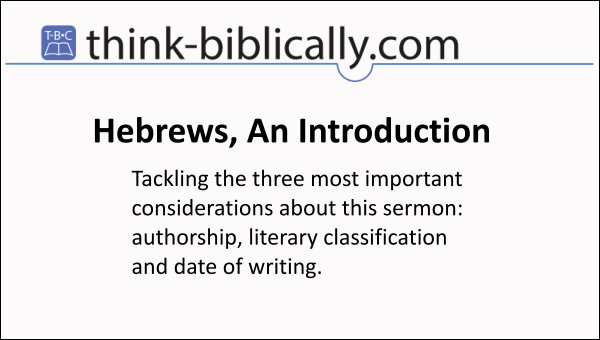By Tyson Thorne

The Book of Hebrews has long been both inspirational and mysterious. Inspirational in its message of the superiority of Jesus, the New Covenant and salvation; in the list of the great men and women in the Hall of Faith. It's mystery lay in some of its teachings and in its authorship. In the three most important considerations concerning the book, authorship is in there somewhere. No one really knows who wrote Hebrews, but the bulk of tradition holds to a Pauline authorship. Although there are differences in style, these can be explained by the shift in literary genre.
The other traditional candidate for authorship is Barnabas who, being a Levite and close friend of Paul’s, might have been capable of writing such a work. Nick-named the "son of encouragement" also gives credence to this engaging and encouraging work.
I'd like to throw my lot in with Martin Luther and suggest a third option: Apollos. He was a Jew who grew up in Egypt. Most of what we know of him comes from Acts 18, including that he was educated at the great Library of Alexandria, and had vast knowledge of the Scriptures. When we first meet Apollos he only knows of the Baptism of John. In Ephesus, Aquila and Priscilla catch him up to speed regarding the death and resurrection of the Messiah, Jesus. He not only became convinced that Jesus is the Messiah, he went to several cities to debate the traditional Jews and prove to them the same. He was also a regular preacher in Corinth, which you'll see adds to the likelihood of his authoring Hebrews.
The second important consideration is the question of literary category. Hebrews is not an epistle (like Romans) as several sources state. The structure is all wrong and contains no salutation or benediction. Nor is it a book (such as Acts). Rather than relating a historic narative like the Gospels and the book of Acts, it is focused on theology and Christian living. It is, in fact, a homily (sermon). As such it is structured differently from Paul's letters
The third consideration is the date of writing. This is fairly easy to discern. Since the author refers to practicing the sacrificial system it had to be written before the destruction of Jerusalem in AD 70. While it is difficult to discern the exact reason for this sermon, what little we can discern assists us in affixing a date. The sermon discusses the hardships of the early church, of being rejected by the Jewish community and kept from participation in their culture's sacred activities. This situation existed shortly before the destruction of the Temple. For this reason, most scholars agree that a date between AD 67 or 69 is likely. Next time we'll more closely examine the rhetorical problem scholars have with Hebrews.
